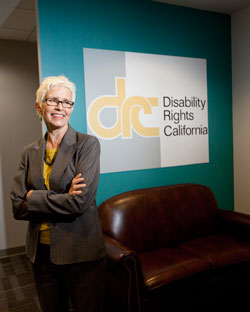Melinda Bird’s journey
from tenant to tenants’ rights advocate earns her top honors
By Amy Yarbrough
Staff writer
Melinda Bird found her passion in life by way of a negligent
landlord.
 Not long out of college, Bird was barely making ends meet
working as a community organizer while living in a women's collective in a
tough neighborhood in Washington, D.C. When a second-story toilet began
leaking, the landlord refused to do anything about it – not just for a few
days, but for months.
Not long out of college, Bird was barely making ends meet
working as a community organizer while living in a women's collective in a
tough neighborhood in Washington, D.C. When a second-story toilet began
leaking, the landlord refused to do anything about it – not just for a few
days, but for months.
A visit to Antioch Law School’s student clinic convinced the
tenants to go on a rent strike. It also inspired Bird to become a lawyer.
“I was really impressed that this was the way to do the
social change work I had been doing already and make a living at it,” she said.
More than three decades later, Bird’s career move has helped
thousands of disabled and low-income Californians. Now director of litigation
for Disability Rights California in Los Angeles, she will be honored with the
2012 Loren Miller Legal Services Award for lifetime achievement on Oct. 12,
during the State Bar’s Annual Meeting.
Named for the late African American judge, lawyer and civil
rights leader, the Loren Miller award recognizes attorneys who have made a
long-term commitment to legal services and have done extraordinary work to
provide legal services to the poor.
In a letter supporting Bird’s nomination, Cooley partner
Maureen Alger wrote that she could “think of no attorney more deserving than
Melinda to receive this important recognition.
“She is particularly adept at legal strategy – developing
strong, effective and creative legal arguments, and knowing which battles to
fight and which to finesse … ” according to Alger, whose firm recently took on
its second impact litigation as co-counsel with Disability Rights California.
“Melinda brings a remarkable combination of professionalism,
integrity, determination and grace to her advocacy on behalf of our state’s
most vulnerable citizens,” she added.
Although pleased to receive the award, Bird is modest about
her achievements.
“I feel humbled,” said Bird, who is quick to point out that
key court victories she's credited with were truly a team effort.
“I never did any of this alone,” she said. “I wish we could
give this award to everyone I ever worked with.”
Bird started her law career in a legal services office in
rural Appalachia more than 33 years ago. A few years later, she headed for
California, spending 15 years with the Western Center on Law and Poverty
litigating class action and impact cases on behalf of the homeless and
low-income.
Bird first joined the Disability Rights California (then
known as Protection and Advocacy) in 1995 as a managing attorney. She then took
a job as senior counsel with the American Civil Liberties Union of Southern
California for three years before returning to Disability Rights California in
2009.
Over the years, Bird has brought groundbreaking litigation
that has benefited Californians with mental disabilities, homeless families, adults
who are indigent, people in institutions and others. Thanks to her efforts in Emily
Q. v. Bonta, 208 F. Supp. 2D 1078 (C.D. Cal. 2001, aff'd 203 Fed.Appx. 35,
9th Cir. unpublished disposition, October 2006), Medicaid-eligible
children who once might have found themselves locked up in mental health or
residential facilities must now be provided with intensive home and community-based
services.
Working with lawyers for home care providers, Bird scored
another monumental victory in Oster v. Lightbourne, (previously V.L. v.
Wagner), 669 F.Supp.2d 1106 (N.D. Cal., 2009) and 2012 WL 691833 (3/2/12). On
two different occasions, Bird and her team successfully fought major cuts to
the state's home care program, which would have affected thousands of elderly
and disabled Californians who rely on those services to stay out of nursing
homes.
Bird also counts among the highlights of her career work
that she did at the ACLU to fight inmate abuse at the Los Angeles County jail.
“We found a level of violence and abuse directed, in part,
at prisoners with disabilities, but also across the board,” she said.
Bird, who had never done prison work, learned of
multiple inmates kept for long periods in small, bed-less compartments originally
meant as temporary holding cells and a litany of other abuses she describes as
“soul-shattering.”
Conditions were so abusive, Bird likened it to an
Iraqi prison. “It was like Abu Ghraib,” she said.
UCLA law school professor Gary Blasi was part of a homeless
litigation team with Bird back in the early 1980s. He said he was quickly
struck by Bird's talent, citing as an example Hansen v. McMahon, 193
Cal.App.3d 283 (1987), which found that the state has a duty to provide
emergency shelter to children in homeless families. Previously, only
individuals could receive assistance, and were often separated from their
children as a condition of receiving help, a practice that Bird argued was
unconstitutional to both parents and children.
“That framing of the case was just irrefutable,” Blasi said.
Bird, who was inspired by law students to pursue a legal
career many years ago, is now inspiring law students herself.
Blasi has invited her speak to his students at UCLA a number
of times, and she always leaves a lasting impression.
“I’ve never encountered any law students who didn’t want to
grow up to be Melinda Bird,” he said, “including some pretty tough-looking
guys.”